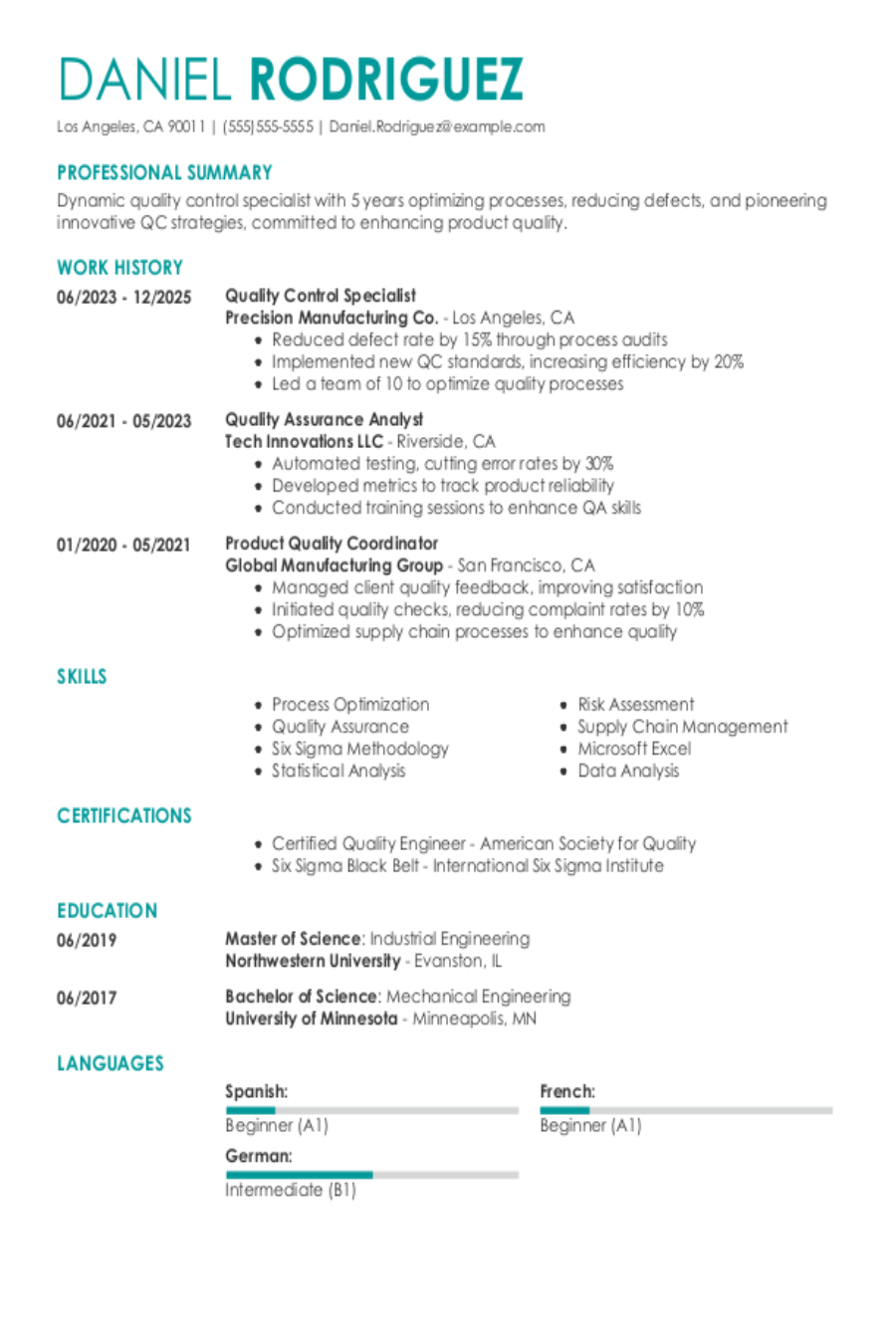You may have heard about hard and soft skills, but do you know the difference?
If not, don’t worry! We’ll teach you to distinguish them so you can improve your resume and have better success communicating your qualifications to employers.
Here’s what you’ll find on this page:
- The definition of hard skills and soft skills.
- 30+ hard and soft skills you could add to your resume.
- How to include hard skills vs soft skills on a resume.
Want to quickly update your resume? Consider using our AI Resume Builder. Whether you want to simply add new hard and soft skills to your current resume or start a new one altogether, we can help you get it done in just a few clicks. Try it today!
Hard Skills vs Soft Skills: What’s the Difference?
So, what is the difference between hard skills and soft skills?
- Hard skills are specific professional traits required to perform certain tasks or use certain tools. They are often quantifiable and acquired through education, training, certifications or on-the-job experience.
- Soft skills are interpersonal and behavioral traits that determine how well you work with others and in various situations. Though these skills are often harder to measure, they are crucial for teamwork and professional success.
Another way to look at it is that hard skills, such as technical skills, allow you to perform very specific tasks, while soft skills are intangible qualities, like communication, that determine how you work on that task.
Let’s jump into some examples of hard and soft skills to give you a better idea of how these skills work together to make you a strong candidate.
30+ Examples of Hard vs Soft Skills
Include a balanced mix of both hard and soft skills on your resume to show you are a well-rounded candidate.
Here are some examples of each skill set to help inspire you.
Hard skills
Hard skills change from job to job. For some, you may need a technical skill, like proficiency with a particular computer software. For others, it might be a deep knowledge of AP Style or customer service training.
There are thousands of examples of hard skills you could add to your resume. So, make sure they are aligned with the role you’re pursuing.
Here are a few examples:
- A/B testing
- Analytics
- Bookkeeping
- Computer skills
- Copywriting
- Customer management software
- Data analysis
- Editing
- Electrical work
- Excel
- HTML
- Microsoft Office
- Physical therapy
- Plumbing
- Point-of-sale (POS) systems
- PowerPoint
- SEO/SEM
- Web development
- Project management
- WordPress
Soft skills
Just like with hard skills, there are thousands of options you could add to your resume. Read the job ad to see if any are specifically called out, and use those if you possess them.
Then, think about your most valuable interpersonal skills and add those, too. Or, if you need more inspiration, review our resume examples for more, job-specific soft skills.
Here are some examples to get you thinking:
- Active Listening
- Adaptability
- Analytical
- Collaboration
- Communication
- Conflict resolution
- Creativity
- Critical thinking
- Customer service
- Decision-making
- Dependability
- Emotional intelligence
- Empathy
- Interpersonal
- Leadership
- Negotiation
- Open-mindedness
- Organizational skills
- Patience
- Problem-solving
- Teamwork
- Time management
How to List Hard and Soft Skills on Your Resume
Any well-written resume will have an effective balance of both hard and soft skills.
This is because most hiring managers are looking for a well-rounded candidate who can be trusted to perform their individual responsibilities and work well with others.
However, the skills you decide to include must be relevant to the job, which means the balance between hard and soft skills on your resume can change from application to application.
Use our guide to ensure you take the right steps to highlight both hard and soft skills effectively.
Read the job description closely
First things first — read the job ad.
The job ad contains keywords, which are specific terms and phrases that employers use to describe the skills and qualifications they are looking for in a candidate.
These keywords are crucial because applicant tracking systems (ATS) use them to filter and rank resumes. Including these keywords in your resume increases the chances of it passing through the ATS and reaching a human recruiter.
Here’s an example of a job description with all of the skills in bold:
Job Description:
We are seeking a senior sales representative with strong communication skills and a proven track record in sales. The ideal candidate will have experience with CRM software and data analysis. You will be responsible for developing sales strategies, building client relationships and meeting sales targets.
Requirements:
- Bachelor’s degree in business or related field.
- Minimum of five years in sales.
- Proficiency in Excel and PowerPoint.
- Excellent negotiation and problem-solving abilities.
- Ability to work in a fast-paced environment.
When you review a job ad, take a pen — or the bold function on your word processor — and underline or highlight the skills likely to be keywords. Add the relevant ones to your resume. Let’s find out how to do this effectively!
Create a skills section
Your skills section is an excellent place to highlight your skills.
When writing the skills section of your resume, be sure to include the hard skills that are most relevant to your role. When mentioning technical skills, like Google Analytics, it’s wise to only include the skills you are highly proficient in.
Finally, use bullet points to make the section easier to scan.
Include your skills in the summary or objective
The skills section isn’t the only place on your resume to incorporate hard and soft skills into.
Your profile near the top of your resume is the perfect place to highlight your top four or five skills. A resume’s profile can take the form of a professional summary or a resume objective.
A professional summary should be between two to five sentences long and highlight your most relevant and impressive skills and accomplishments. If you are listing an accomplishment, highlight which skills you used to achieve success.
Similarly, a resume objective details your skills and enthusiasm for the position. Since a resume objective does not include work experience, this gives you ample space to include relevant skills that make you a motivated candidate.
Use strong action words to describe your achievements and skills. Words like “developed,” “implemented,” “led” and “improved” can make your resume more dynamic and impactful.
Include skills in your work experience
Your work experience section provides an opportunity to show potential employers not only which hard and soft skills you possess but how you put them to work in specific roles.
By detailing your responsibilities and accomplishments, you can draw a direct connection to the impact your skills had and underscore your value as an employee.
Ultimately, your resume shouldn’t pit your skills against each other — hard and soft skills should work together in harmony to showcase your strengths.
Help your resume pass the ATS by incorporating keywords from the job description into your work experience section.
More Skills
Looking for more help with your skills? Check out our library of skills guides:
Soft vs Hard Skills — Key Takeaways
Hard skills are measurable and teachable
Hard skills can be learned through education, training and certifications. These skills are quantifiable and often tested in professional settings.
Soft skills are interpersonal and behavioral
Soft skills relate to how you interact with others and handle various situations. They are often more challenging to measure but are crucial for effective collaboration.
A strong resume includes a mix of both
A well-rounded resume showcases a balance of hard and soft skills. This combination demonstrates that you have the technical expertise needed for the job.
Always tailor your skills to match the job description
Customize your resume for each job application by aligning your skills with the specific requirements of the job description.
Was this information about Hard Skills Vs Soft Skills helpful? Let us know!
Don is a Certified Professional Resume Writer (CPRW) with more than 10 years’ experience creating digital content, including four years helping job seekers develop their careers. He holds an M.S. in Journalism from Northwestern University.
More resources

How to Make a Canadian Resume (Format, Template + Examples)
Creating a Canadian resume is key to getting a job in Canada. ...

How to Write a Resume for an Internal Position (Guide + Examples)
Ready for a new role within the same company? We ll help you...

The Great Workplace Reckoning: How 2025 Burned Out Workers & What’s Next for 2026
Resume Now provides a look inside the burnout pay and ethics...

Plumbing Resume: Examples & Templates
Build & download your Plumbing resume in a few simple steps. B...

Purchasing Resume: Examples & Templates
Build & download your Purchasing resume in a few simple steps....

Quality Control Resume: Examples & Templates
Build & download your Quality Control resume in a few simple s...
